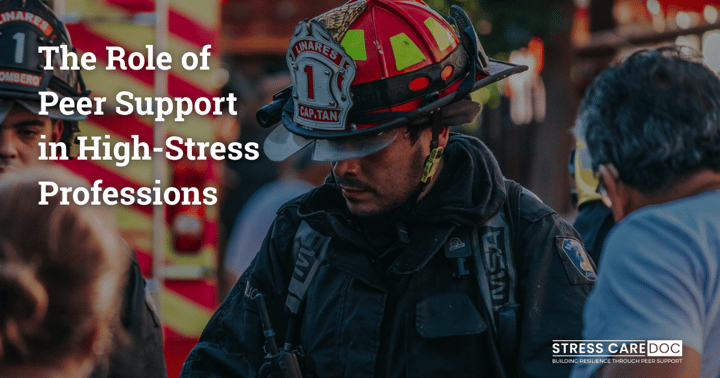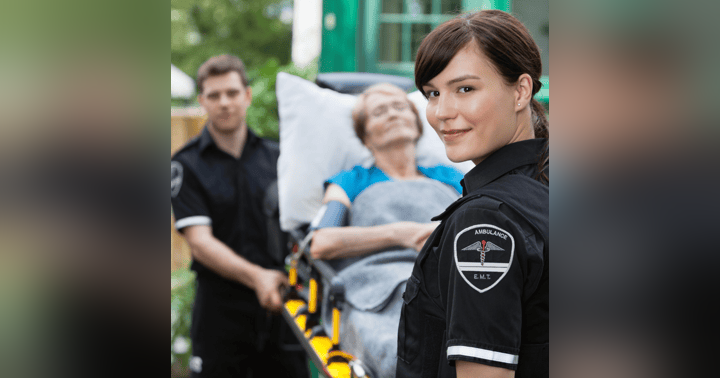Decoding Your Body's Signals: Hidden Symptoms of Traumatic Stress

We often think of stress as a temporary inconvenience, something we can power through with enough caffeine and sheer willpower. But what happens when stress becomes chronic, even traumatic? It starts to leave its mark, not just on our minds but on our bodies as well. Many of us, especially those in high-stress professions like first responders, medical professionals, and other frontline workers, may be experiencing symptoms of traumatic stress without even realizing it. Your body is trying to tell you something. Hopefully, after reading this article, you'll be able to tell the difference between everyday stress and long-term trauma and take advantage of the steps to bounce back. This is a companion piece to our latest podcast episode, When the Job Follows You Home: The Hidden Signs of Traumatic Stress, where we explore these issues in even greater detail. We invite you to listen and learn how to reclaim your health and well-being.
The Difference Between Everyday Stress and Long-Term Traumatic Stress
There is a difference between everyday stress and traumatic stress. Everyday stress is the kind we all experience – a tight deadline at work, a disagreement with a loved one, or getting stuck in traffic. These stressors are usually short-lived, and our bodies and minds are generally equipped to handle them. We might feel tense, anxious, or irritable for a while, but eventually, we return to our baseline state.
Long-term traumatic stress, on the other hand, is a different beast. It stems from prolonged exposure to highly stressful or traumatic events. This could include repeated exposure to violence, witnessing suffering, or working in consistently high-pressure environments. Unlike everyday stress, traumatic stress overwhelms our coping mechanisms and can lead to lasting changes in our brain and body.
Consider a firefighter who regularly responds to calls involving severe injuries or fatalities. Or a nurse working in an understaffed emergency room, constantly facing life-or-death situations. These individuals aren't just experiencing typical work stress; they are repeatedly exposed to potentially traumatic events, which can lead to a build-up of stress that becomes chronic and debilitating. The key difference is the intensity and duration of the stressor, and the resulting impact on the individual's ability to cope and recover.
The continuous activation of the stress response in traumatic stress leads to a state of hyperarousal, where the body is constantly on alert. This can disrupt sleep, impair cognitive function, and weaken the immune system. It can even alter the way we process emotions and relate to others, leading to feelings of detachment, cynicism, and hopelessness.
Hidden Symptoms of Traumatic Stress: Mental and Emotional Signs
Traumatic stress doesn’t always manifest as the stereotypical "flashbacks" or nightmares often associated with PTSD. In many cases, the symptoms are more subtle and insidious, creeping into our lives unnoticed until they become overwhelming. Here are some mental and emotional signs of traumatic stress that are often overlooked:
- Irritability and Anger: Feeling easily frustrated, snapping at loved ones, or having a short fuse. This can manifest as disproportionate reactions to minor inconveniences.
- Emotional Numbness: A sense of detachment from your feelings, difficulty experiencing joy, or feeling emotionally flat. Things that used to bring pleasure no longer do.
- Anxiety and Panic Attacks: Persistent worry, racing thoughts, and sudden episodes of intense fear accompanied by physical symptoms like rapid heart rate, sweating, and shortness of breath.
- Difficulty Concentrating: Trouble focusing, forgetfulness, and impaired decision-making. This can affect work performance and daily functioning.
- Negative Thoughts and Beliefs: A pessimistic outlook on life, feeling hopeless about the future, and having negative thoughts about oneself or others.
- Intrusive Thoughts: Unwanted and distressing thoughts that pop into your head, often related to the traumatic experiences.
- Hypervigilance: Being constantly on the lookout for danger, feeling jumpy or easily startled, and having difficulty relaxing. You're always waiting for the other shoe to drop.
- Dissociation: Feeling detached from your body or surroundings, as if you're watching your life from the outside. This can manifest as "spacing out" or feeling unreal.
Behavioral Symptoms You Might Be Ignoring
Beyond the mental and emotional signs, traumatic stress can also manifest in our behavior. These behavioral changes are often subtle and can be easily dismissed as personality quirks or bad habits. However, they can be important indicators of underlying traumatic stress.
- Social Withdrawal: Isolating yourself from friends and family, avoiding social gatherings, and preferring to be alone.
- Changes in Sleep Patterns: Difficulty falling asleep or staying asleep, nightmares, or excessive sleeping. This can lead to chronic fatigue and daytime sleepiness.
- Changes in Eating Habits: Loss of appetite, overeating, or developing unhealthy eating patterns. This can result in weight gain or loss and nutritional deficiencies.
- Increased Substance Use: Turning to alcohol, drugs, or other substances to cope with stress or numb emotions. This can lead to addiction and other health problems.
- Reckless Behavior: Engaging in risky activities, such as reckless driving, unprotected sex, or excessive gambling.
- Difficulty with Relationships: Problems with intimacy, communication, and trust in relationships. This can lead to conflict and isolation.
- Neglecting Self-Care: Failing to take care of your physical and emotional needs, such as skipping meals, not exercising, or neglecting personal hygiene.
- Procrastination and Avoidance: Putting off important tasks, avoiding situations that trigger anxiety, or struggling to complete projects.
Physical Ailments Linked to Traumatic Stress
The connection between mind and body is undeniable, and traumatic stress can have a profound impact on our physical health. Chronic stress can weaken the immune system, disrupt hormonal balance, and increase the risk of various physical ailments. Here are some physical symptoms often linked to traumatic stress:
- Chronic Pain: Persistent aches and pains, such as headaches, back pain, muscle tension, and joint pain.
- Digestive Problems: Irritable bowel syndrome (IBS), stomach ulcers, nausea, constipation, or diarrhea.
- Fatigue: Persistent tiredness and lack of energy, even after adequate rest.
- Cardiovascular Issues: High blood pressure, rapid heart rate, chest pain, and increased risk of heart disease.
- Weakened Immune System: Frequent colds, infections, and slower healing.
- Skin Problems: Eczema, psoriasis, acne, and other skin conditions.
- Respiratory Issues: Asthma, allergies, and shortness of breath.
- Dizziness and Lightheadedness: Feeling faint or unsteady, often accompanied by nausea.
Real-Life Examples: Recognizing the Signs in Yourself and Others
Let's consider some real-life examples to illustrate how traumatic stress can manifest in different ways. Recognizing these signs in yourself or others can be the first step towards seeking help.
Example 1: A paramedic who routinely responds to traumatic accidents starts experiencing chronic headaches and digestive problems. He becomes irritable and withdrawn, snapping at his partner and avoiding social gatherings. He starts drinking more alcohol to cope with the stress, leading to further health problems.
Example 2: A nurse working in a busy emergency room feels emotionally numb and detached from her work. She struggles to concentrate and make decisions, putting her patients at risk. She experiences nightmares and difficulty sleeping, leading to chronic fatigue and burnout.
Example 3: A police officer who has responded to multiple shootings develops hypervigilance and anxiety. He is constantly on the lookout for danger and has difficulty relaxing. He becomes increasingly isolated and struggles to maintain relationships with his family.
Example 4: A social worker dealing with child abuse cases feels overwhelmed and hopeless. She starts neglecting her self-care, skipping meals and not exercising. She experiences intrusive thoughts about the cases and has difficulty sleeping. She becomes cynical and detached, losing her passion for her work.
In each of these examples, the individuals are experiencing a combination of mental, emotional, behavioral, and physical symptoms that are indicative of traumatic stress. Recognizing these patterns is crucial for early intervention and preventing further deterioration of their health and well-being.
Five Practical Steps to Get Out of Survival Mode and Start Healing
If you recognize any of these symptoms in yourself or someone you know, it's important to take action. Here are five practical steps you can take to get out of survival mode and start healing:
- Acknowledge and Validate Your Feelings: The first step is to acknowledge that you're struggling and validate your feelings. Don't minimize or dismiss your experiences. Recognize that what you're going through is a normal reaction to abnormal circumstances.
- Practice Self-Care: Prioritize self-care activities that help you relax, recharge, and reconnect with yourself. This could include exercise, meditation, yoga, spending time in nature, listening to music, or engaging in hobbies you enjoy.
- Seek Professional Help: Consider seeking professional help from a therapist or counselor who specializes in trauma. They can provide support, guidance, and evidence-based treatments like Cognitive Behavioral Therapy (CBT) or Eye Movement Desensitization and Reprocessing (EMDR).
- Build a Support System: Connect with trusted friends, family members, or support groups. Sharing your experiences with others who understand can help you feel less alone and more supported.
- Establish Healthy Boundaries: Learn to say no to requests that overwhelm you and set boundaries with people who drain your energy. Protect your time and energy by prioritizing your well-being.
For more specific guidance, don't hesitate to reach out via email at info@stresscaredoc.com or visit StressCareDoc.com
Reclaiming Your Health and Humanity
Decoding your body's signals is the first step to begin reclaiming your health and humanity after experiencing traumatic stress. By recognizing the hidden symptoms and understanding the impact of long-term stress on your mind and body, you can take proactive steps towards healing and recovery. Remember, you're not broken, and you're not alone. There is hope for a brighter future, and with the right support and resources, you can overcome the challenges of traumatic stress and live a fulfilling life. I encourage you to listen to our latest podcast episode, When the Job Follows You Home: The Hidden Signs of Traumatic Stress, for even more in-depth insights and practical strategies for healing. Take care of yourself, and remember that your well-being is paramount.






